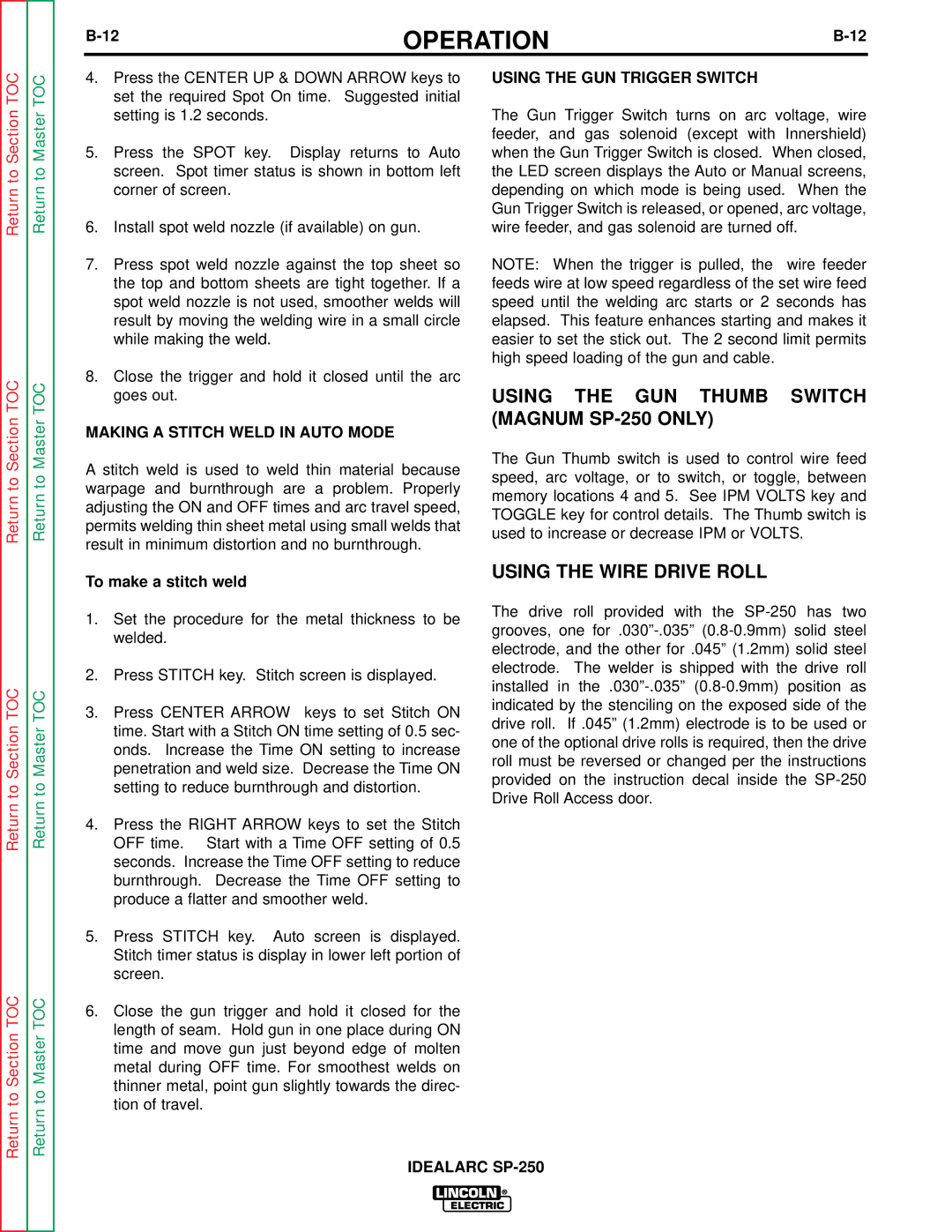
OPERATION | ||
|
|
Return to Master TOC
Return to Master TOC
Return to Master TOC
Return to Master TOC
4.Press the CENTER UP & DOWN ARROW keys to set the required Spot On time. Suggested initial setting is 1.2 seconds.
5.Press the SPOT key. Display returns to Auto screen. Spot timer status is shown in bottom left corner of screen.
6.Install spot weld nozzle (if available) on gun.
7.Press spot weld nozzle against the top sheet so the top and bottom sheets are tight together. If a spot weld nozzle is not used, smoother welds will result by moving the welding wire in a small circle while making the weld.
8.Close the trigger and hold it closed until the arc goes out.
MAKING A STITCH WELD IN AUTO MODE
A stitch weld is used to weld thin material because warpage and burnthrough are a problem. Properly adjusting the ON and OFF times and arc travel speed, permits welding thin sheet metal using small welds that result in minimum distortion and no burnthrough.
To make a stitch weld
1.Set the procedure for the metal thickness to be welded.
2.Press STITCH key. Stitch screen is displayed.
3.Press CENTER ARROW keys to set Stitch ON time. Start with a Stitch ON time setting of 0.5 sec- onds. Increase the Time ON setting to increase penetration and weld size. Decrease the Time ON setting to reduce burnthrough and distortion.
4.Press the RIGHT ARROW keys to set the Stitch OFF time. Start with a Time OFF setting of 0.5 seconds. Increase the Time OFF setting to reduce burnthrough. Decrease the Time OFF setting to produce a flatter and smoother weld.
5.Press STITCH key. Auto screen is displayed. Stitch timer status is display in lower left portion of screen.
6.Close the gun trigger and hold it closed for the length of seam. Hold gun in one place during ON time and move gun just beyond edge of molten metal during OFF time. For smoothest welds on thinner metal, point gun slightly towards the direc- tion of travel.
USING THE GUN TRIGGER SWITCH
The Gun Trigger Switch turns on arc voltage, wire feeder, and gas solenoid (except with Innershield) when the Gun Trigger Switch is closed. When closed, the LED screen displays the Auto or Manual screens, depending on which mode is being used. When the Gun Trigger Switch is released, or opened, arc voltage, wire feeder, and gas solenoid are turned off.
NOTE: When the trigger is pulled, the wire feeder feeds wire at low speed regardless of the set wire feed speed until the welding arc starts or 2 seconds has elapsed. This feature enhances starting and makes it easier to set the stick out. The 2 second limit permits high speed loading of the gun and cable.
USING THE GUN THUMB SWITCH (MAGNUM SP-250 ONLY)
The Gun Thumb switch is used to control wire feed speed, arc voltage, or to switch, or toggle, between memory locations 4 and 5. See IPM VOLTS key and TOGGLE key for control details. The Thumb switch is used to increase or decrease IPM or VOLTS.
USING THE WIRE DRIVE ROLL
The drive roll provided with the
